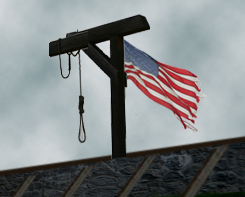Tag: death penalty (page 6)

Attorney General Michael Mukasey was in London speaking to a group at the London School of Economics. After his speech, and speaking for himself only, he said he he personally opposed the death penalty for the 9/11 detainees at Guantanamo. He gave an analogy.
"I kind of hope they don't get it," Mukasey said after a speech at the London School of Economics. "Because many of them want to be martyrs, and it's kind of like the conversation … between the sadist and the masochist.""The masochist says hit me and the sadist says no, so I am kind of hoping they don't get it," he said.
Mukasey noted that the military commission trials at Gitmo are being conducted by the Defense Department, not the Justice Department, although DOJ is cooperating with them.
Law professor Doug Berman at Sentencing Law and Policy is outraged at Mukasey's comments. I'm not. [More...]
(12 comments, 836 words in story) There's More :: Permalink :: Comments
The New York Times examines why the feds have been so unsuccessful in getting death penalty convictions in New York State.
In the 20 years since the federal death penalty statute was revived, no federal juries have been more reluctant to sentence federal defendants to death than those in New York.
The Justice Department's losing record in New York: 19 to 1, since 1988. Nationally, the feds win about 1/3 of their capital cases.
One reason is the reluctance of jurors to impose it. Another is the quality of the New York capital defenders. A third is the sometimes unsympathetic victims.
But there's more. The Judges are weighing in, on everything from the exorbitant expense to the arbitrariness and disparity in the system. More...
(11 comments, 625 words in story) There's More :: Permalink :: Comments
Today, U.S. Attorney General Michael Mukasey showed he might be taking a different tack. North Dakota U.S. Attorney Drew Wigley announced today that Mukasey had rejected seeking the death penalty against several defendants in a drug conspiracy case involving an alleged murder:
The decision was announced Friday by U.S. Attorney Drew Wrigley, after he received a letter from U.S. Attorney General Michael Mukasey. Wrigley said it was a short statement by Mukasey."He now sets the record for the most direct of the three attorneys general I've worked for. I'll leave it at that," Wrigley said.
The latest decision came in the case of defendant Martin Avila, age 21, accused of being a fugitive and a meth trafficker who used a firearm to kill Lee Avila of East Grand Forks, Minn. Avila is one of "more than 60 people charged in the case known as Operation Speed Racer."
Mukasey also rejected death filings against three other defendants accused in Avila's death.
"The facts are obviously well-known to them," said Wrigley, referring to the Justice Department. "We put together an entire synopsis with every possible aspect of the case and they considered it very thoroughly (in the death penalty decision)."
(3 comments) Permalink :: Comments
U.S. District Court Judge Clarence Brimmer in Wyoming has overturned a state death sentence and ordered a new trial for inmate James Harlow who was convicted of murdering a prison guard in 1997. Among the myriad of reasons:
In a 230-page ruling, Brimmer stated that Harlow was denied a fair trial in state court because conflicts between his original lawyer, Keith Goody, and the former state public defender Sylvia Hackl. The judge said that Goody was made to fear he would be fired for doing his job and insisting on more resources to defend Harlow.
[More...]
(4 comments, 249 words in story) There's More :: Permalink :: Comments

The Nebraska Supreme Court yesterday ruled that the use of the electric chair to execute inmates constitutes cruel and unusual punishment.
The evidence shows that electrocution inflicts "intense pain and agonizing suffering," the court said. "Condemned prisoners must not be tortured to death, regardless of their crimes," Judge William Connolly wrote in the 6-1 opinion.
"Contrary to the State's argument, there is abundant evidence that prisoners sometimes will retain enough brain functioning to consciously suffer the torture high voltage electric current inflicts on a human body," Connolly wrote.
Nebraska is the only state in the country still using the barbaric method of execution. The legislature must now authorize another means before the state can put anyone to death.
Any chance there are any legislators in Nebraska who will say, "Choose Life, End the Death Penalty?"
(12 comments) Permalink :: Comments
Four presidential cycles ago today, Hillary's husband dropped a syringe plunger in the old Democratic party.
(961 words in story) There's More :: Permalink :: Comments
The good news is that the United Nations passed a non-binding resolution to put an end to capital punishment by an overwhelming vote of 104 to 54 with 29 abstentions:
(242 words in story) There's More :: Permalink :: Comments
Even before his execution, the Swedish immigrant was widely thought to have been railroaded for his IWW affiliation.
Though state authorities had little use for the worldwide clemency bid whose backers included U.S. President Woodrow Wilson -- powerless to intervene officially, since the execution was a state matter -- Hill walked spryly into his martyrdom.
(3 comments, 230 words in story) There's More :: Permalink :: Comments
Say hello to a new death penalty blog that launched today -- Executed Today:
Executed Today is a blog of history, sociology, biography, criminology, law, and kismet —- an unrepresentative but arresting view of the human condition across time and circumstance from the parlous vantage of the scaffold. This blog each day chronicles an historical execution that took place on that date, and the story behind it.
....Executed Today is a daily chronicle — each day the story of an historical execution that took place on this date, and the story behind it.
While the author is personally opposed to the death penalty, he says the blog is neither pro or anti-death penalty:
More...
(5 comments, 253 words in story) There's More :: Permalink :: Comments


In a report released today, the American Bar Association is calling for a moratorium on executions in the U.S.
The ABA studied the death penalties in 8 states. It found:
- Spotty collection and preservation of DNA evidence, which has been used to exonerate more than 200 inmates;
- Misidentification by eyewitnesses;
- False confessions from defendants; and
- Persistent racial disparities that make death sentences more likely when victims are white.
It's conclusion:
"After carefully studying the way states across the spectrum handle executions, it has become crystal clear that the process is deeply flawed," said Stephen F. Hanlon, chairman of the ABA Death Penalty Moratorium Implementation Project. "The death penalty system is rife with irregularity."
I'll update with a link to the report when it's available.
(1 comment) Permalink :: Comments


While we're on the topic of the Patriot Act today, the L.A. Times reports that the Justice Department may begin using one of its rarely noted provisions -- one that gives the Attorney General the power to shorten the time period within which state death row inmates can file federal appeals of their death sentences. New regulations have been proposed to implement the power.
The rules implement a little-noticed provision in last year's reauthorization of the Patriot Act that gives the attorney general the power to decide whether individual states are providing adequate counsel for defendants in death penalty cases. The authority has been held by federal judges.
Under the rules now being prepared, if a state requested it and Gonzales agreed, prosecutors could use "fast track" procedures that could shave years off the time that a death row inmate has to appeal to the federal courts after conviction in a state court.
As for what the new regulations provide:
The procedures would cut to six months, nstead of a year, the time that death row inmates have to file federal appeals once their cases have been resolved in the state courts.
It would also impose strict guidelines on federal judges for deciding such inmates' petitions. Federal district judges would have 450 days, appeals courts 120 days.
If it weren't so serious, this line would make me laugh: "Proponents say that would prevent foot-dragging by liberal judges."
As if that's the problem given the number of wrongfully convicted people on death row, those denied adequate counsel and DNA testing at the state level, and a host of other constitutional guarantees.
It was bad enough that AEDPA limited habeas appeals to one year. This is even worse.
Update: The ACS blog has more.
(7 comments) Permalink :: Comments
I believe that jurors should be life-qualified not death-qualified to serve on a capital jury. But, that's not the law.
The Supreme Court today, in an opinion written Justice Anthony Kennedy, reinstated the death sentence of a Washington man whose sentence was overturned because a juror had said he would consider the death penalty only in limited circumstances.
The court, in a 5-4 decision, said that the Washington state judge who presided over the trial of Cal Coburn Brown properly used his discretion to excuse a potential juror who expressed equivocal views about the death penalty.
The juror in question was challenged by prosecutors because he indicated he would impose the death penalty only if the defendant were in the position to kill again. Jurors' options were limited: they could sentence Brown to death or life in prison with no parole.
The text of the opinion is here (pdf). As the 9th Circuit noted in deciding the case differently, the juror did not unequivocally impose the death penalty.
More...
(3 comments, 342 words in story) There's More :: Permalink :: Comments
| << Previous 12 | Next 12 >> |







